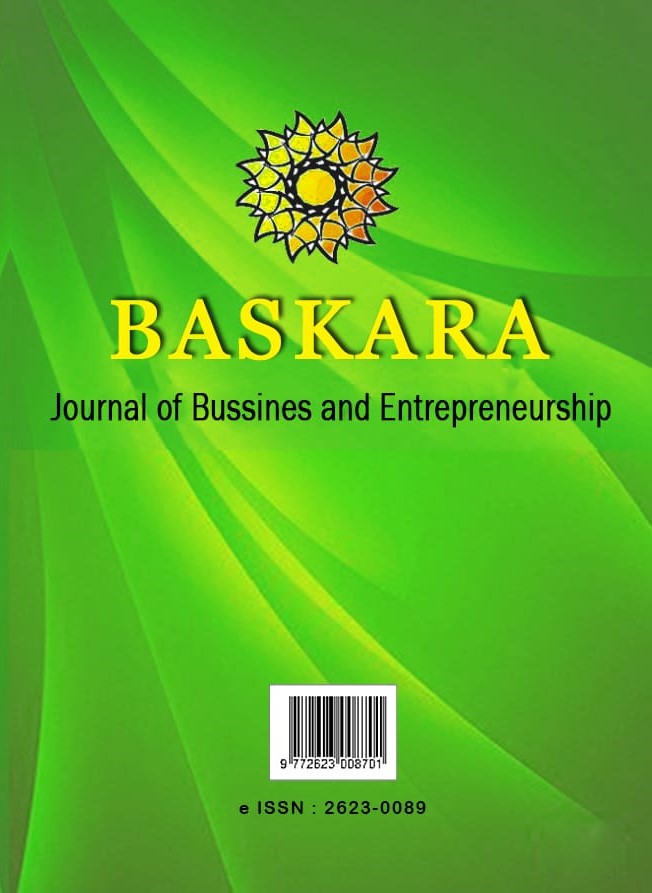The Ummatic Elements in Malaysia-Turkey Economic Cooperation: A Study on Investment Aspects
DOI:
https://doi.org/10.54268/baskara.v5i2.16509Keywords:
Diplomatic History, OIC and D-8, Economic Relations Malaysia and TurkeyAbstract
The investment aspect is one of the most important aspects in strengthening the economy of a country. As countries that practice an open economic policy, Malaysia and Turkey emphasize the investment aspect of whether Foreign direct investment (FDI) and Direct Investment Abroad (DIA). Malaysia and Turkey are also major players in the Organization of Islamic Cooperation (OIC) and the Economic Cooperation Organization of Eight Developing Countries (D-8). It turns out that these two Islamic organizations have succeeded in becoming catalysts in improving the economy of both countries. These two organizations also clearly make the ummatic agenda the main agenda of the establishment as well as fighting for the welfare of Muslims. This is proven that the amount of investment for these two countries is increasing over time. The diversity of investment sectors is also seen to be increasing based on the needs of Malaysia and Turkey. This study uses a qualitative method that leads to the study of the discipline of history by emphasizing the analysis of primary sources, secondary sources and interviews to produce an authoritative study.References
Almasi, H. (2012). Investigating Status of Developing Eight (D8) Countries’ Macroeconomic
Indices in Line with Developing Economic Cooperation with Iran. African Journal of
Business Management, 6(20), 6166–6176.
Bank Negara Malaysia. (1995). Cash-Based Balance of Payments Reporting System 1995.
Bank Negara Malaysia. (2018). A Critical Assessment of Direct Investments Abroad (DIA) and
the Changing Nature of Foreign Direct Investments (FDI).
Azlina, N., Maesarach, R. M., & Said, M. (2022). Islamic Economic Methodology Aproach to
Achieve Economic Equity: Epistemological Study. BASKARA: Journal of Business and
Entrepreneurship, 4(2), 28-39.
Department of Statistics Malaysia. (2018). Press Releases Related to Foreign Direct Investment
Statistics in Malaysia 2017.
Evyap Sabun Malaysia Goes to Europe. (2015, November 17). BERNAMA.
Ferhat, D., & Syaza, S. (2019). Turkey-Malaysia Relations in the 21st Century. Bolgesel
Arastirmalar Dergisi, 3(1), 115–148.
Idris, Asmady & Idris, R. Z. (2021). Analisis Faktor Terpenting yang Mempengaruhi Corak
Hubungan Malaysia-Australia Era Mahathir Mohamad. KEMANUSIAAN: The Asian Journal
of Humanities., 28(2), 53–78.
Idris, A. (2015). Malaysia’s Relations with Saudi Arabia: 1957-2003. Universiti Malaysia Sabah.
Interview with Datuk Ahmad Azam Abdul Rahman, Former President of ABIM in Gombak.
(2019).
Interview with the Minister of Foreign Affairs of Malaysia, Dato’ Saifuddin Abdullah at his office
at Wisma Putra. (2019).
LTC, M. H. I. (2016, July). Exclusive Interview with Former Turkish Grandmaster to Malaysia,
Başak Türkoğlu. Aswaq Magazine.
Maesarach, M. (2019). Dampak Penerapan Psak 108 Pada Strategi Meningkatkan Solvabilitas
Perusahaan Asuransi Syariah. BASKARA Journal of Business & Entrepreneurship, 2(1), 21–
MAHB Open to Offers to Buy a Stake in Istanbul Airport. (2017, November 29). New Straits
Times.
Media, K. N. (2014). Khazanah Investments in Turkey Underscore Strong Bilateral and
Commercial Relations between Malaysia and Turkey.
MIDA. (2014). Malaysia Businesses Urged to Epand Ties with Turkey – Najib.
Mohamad Shaukhi Mohd Radzi, Mohd Sohaimi Esa, Z. O. (2020). Elemen Pan-Islamisme Dalam
Hubungan Empayar Uthmaniyyah Dengan Kerajaan Kesultanan Johor dari Abad Ke-18
Masihi Hingga Perang Dunia Pertama. Jurnal Kinabalu, 26(2), 23-49.
Najib in Turkey to Boost Trade Ties. (2014, April 17). The Star Online.
Official Portal of FNSS Savunma Sistemleri A.Ş. (n.d.). Retrieved April 26, 2021, from
https://www.fnss.com.tr/en/who-we-are/company-profile
Poon, W. C. (2005). The Development of Malaysian Economy. In The Development of
Malaysian Economy (p. 190). The Development of Malaysian Economy.
Saim, K. (2015). Economic Cooperation Among OIC Countries: A Case Study of Turkey and
Malaysia. Journal of Emerging Economies and Islamic Research, 3(2), 29–45.
Selçuk, C. (2021). Turkey’s Engagement with Southeast Asia.
Telephone interview with the former Minister of International Trade and Industry, Mustapha
Muhamed. (2019).The UNCTAD Official Portal. (2021). https://unctadstat.unctad.org/EN/
Downloads
Published
Issue
Section
License
In order for Baskara: Journal of Business and Entrepreneurship to publish and disseminate research articles, we need publishing rights (transfered from author(s) to publisher). This is determined by a publishing agreement between the Author(s) and Baskara Journal. This agreement deals with the transfer or license of the copyright of publishing to Baskara: Journal of Business and Entrepreneurship, while Authors still retain significant rights to use and share their own published articles. Baskara : Journal of Business and Entrepreneurship supports the need for authors to share, disseminate and maximize the impact of their research and these rights, in any databases.
As a journal Author, you have rights for a large range of uses of your article, including use by your employing institute or company. These Author rights can be exercised without the need to obtain specific permission. Authors publishing in Baskara : Journal of Business and Entrepreneurship have wide rights to use their works for teaching and scholarly purposes without needing to seek permission, including:
- use for classroom teaching by Author or Author's institution and presentation at a meeting or conference and distributing copies to attendees;
- use for internal training by author's company;
- distribution to colleagues for their reseearch use;
- use in a subsequent compilation of the author's works;
- inclusion in a thesis or dissertation;
- reuse of portions or extracts from the article in other works (with full acknowledgement of final article);
- preparation of derivative works (other than commercial purposes) (with full acknowledgement of final article);
- voluntary posting on open web sites operated by author or author’s institution for scholarly purposes.
Copyright Transfer Agreement for Publishing (Publishing Right)
The Authors who submit manuscript has to understand that if accepted for publication, mean that all copyright and publishing right of the article shall be assigned/transferred to Baskara: Journal of Business and Entrepreneurship as assigned publisher.
- CC BY-NC: This license allows reusers to distribute, remix, adapt, and build upon the material in any medium or format for noncommercial purposes only, and only so long as attribution is given to the creator.
It includes the following elements:
BY ![]() – Credit must be given to the creator
– Credit must be given to the creator
NC ![]() – Only noncommercial uses of the work are permitted
– Only noncommercial uses of the work are permitted
Baskara (C) Copyright (2022):
BASKARA: Journal of Business and Entrepreneurship by https://jurnal.umj.ac.id/index.php/baskara
is licensed under a Creative Commons Attribution-NonCommercial 4.0 International License








